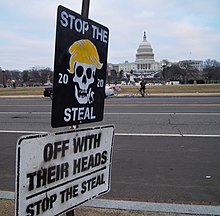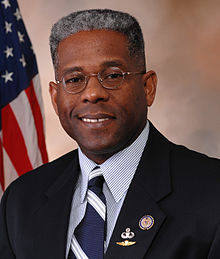Republican efforts to restrict voting following the 2020 presidential election
[37][38][39][40] As summarized by the Associated Press, "stronger voting regulations have long been a conservative goal, driven by old – and some say outdated – conventional wisdom that Republicans thrive in elections with lower turnout, and Democrats in ones with more voters.
[d] Immediately following the 2020 election, Donald Trump and his allies in the Republican Party used the false claims of electoral fraud Trump had been propounding for months,[56][57][58] as well as a fabricated narrative of an international communist conspiracy involving Hugo Chavez and Dominion Voting Systems,[59][60][61] as pretext to initiate an unprecedented effort to overturn the victory of Democratic candidate Joe Biden.
[88] According to the New York Times, "Out of power in both Congress and the White House, the [Republican] party views its path to regaining a foothold in Washington not solely through animated opposition to Mr. Biden's agenda, but rather through an intense focus on re-engineering the voting system in states where it holds control".
[1][92][93] Despite a lack of concrete evidence of election fraud, Trump and his supporters continued to insist he won and claimed that the real "big lie" was the idea that he lost.
Some Republican activists continued throughout 2021 to pressure state election officials to examine allegations of fraud, asserting they were acting to protect democracy.
passed the Constitution, Campaigns and Elections House committee, but it has faced consternation among other members of his party, with some objecting that it would "provid[e] for early voting".
[98][95] Following the announcement in early March that Alabama secretary of state John Merrill would be appointed co-chair of the Republican State Leadership Committee's group on election integrity, which is set to make recommendations on new policies related to voter rolls, voter ID, and absentee voting, Republican "election integrity" efforts are expected to accelerate.
The auditors released a report five months later finding no proof of fraud and that their ballot recount increased Biden's margin of victory by 360 votes.
County election officials released a final report in January 2022 finding that nearly all of the auditors' allegations of irregularities were false or misleading.
After a six-month investigation, Arizona attorney general Mark Brnovich, a Republican running for Senate in 2022, said in April 2022 he found no proof of 2020 election fraud.
[107] Proposed bills include provisions that would limit or eliminate no-excuse absentee voting,[108] require signatures on absentee ballots be notarized,[109] allow officials to purge voters from the Permanent Early Voting List (a list of people automatically sent mail-in ballots) if they have not voted in both the primary and general elections for two consecutive cycles,[109] require absentee ballots be turned in by hand rather than by mail,[110] require mail-in ballots be postmarked by the Thursday before the election, even if they arrive by Election Day,[111] preemptively forbid same-day voter registration (which the state does not currently offer),[110] outlaw private donations to help conduct elections, including for voter education,[110] and give the state legislature the power to choose the state's electors in the Electoral College, regardless of the outcome of the state's popular vote.
[113] Rep. Athena Salman (D), the top-ranking Democrat on the House Government and Elections Committee, argued that "[Republicans] definitely came in with a plan to make sure the historic voter turnout we saw in 2020 never happens again".
[111] In April 2022, the Arizona Supreme Court dismissed a lawsuit brought by state Republicans to end early voting, including mail-in balloting.
[118] On February 19, 2021, Florida governor Ron DeSantis introduced a slate of voting proposals focused largely on making vote-by-mail more restrictive.
[143] The bill would have restricted where ballot drop boxes can be located and when they can be accessed, required photo identification for absentee voting, shifted back the deadline to request an absentee ballot, made it a misdemeanor for political organizations to hand out food or drink to voters waiting in line, and limited early voting hours on weekends, among many other changes.
[157] On March 25, 2021, both chambers passed Senate Bill 202, now called the "Election Integrity Act of 2021"; it was signed into law by Governor Brian Kemp that evening.
[171] Georgia House Republicans retaliated against Delta by passing a bill ending a tax break on jet fuel (it failed to advance in the state Senate).
[175] Republican lieutenant governor Geoff Duncan said during an April 2021 CNN interview that momentum for the legislation grew from "the fallout from the ten weeks of misinformation that flew in from former president Donald Trump.
Among them, one would make it a felony for anyone besides a family member or caregiver to return another person's absentee ballot;[186] one would disallow the Kansas Secretary of State from extending the deadline absentee ballots postmarked by Election Day must be received by the state,[m][187] which critics worry could disenfranchise voters if the US Postal Service were to experience delays;[187] and one would call on Congress to oppose H.R.
[202] Opponents say the bill could disenfranchise otherwise eligible voters, including college students and disabled or elderly people who don't drive, and would disproportionately affect Native Americans,[202] who are more likely to lack photo ID and often have non-traditional addresses.
In February 2021, Republican state representative Sean Roberts introduced two election-related bills, one that would prohibit the use of electronic voting machines and another that would require all registered Oklahoma voters to re-register before the next general election.
[240] On February 15, 2021, Utah governor Spencer Cox signed into law House Bill 12, which the Brennan Center for Justice claims will "make faulty [voter] purges more likely".
[250] Republican lawmakers have also proposed bills that would end same-day voter registration and make signature verification of absentee ballots stricter.
[252][253] On March 24, 2021, Michigan Republicans introduced a package of 39 election reform bills that would introduce new restrictions to voting access,[254] targeting in particular forms of voting that were the focus of former president Donald Trump's attempts to overturn the 2020 United States presidential election (which focused heavily on Michigan and five other six swing states).
[255] The bills also contain two provisions that would expand ballot access: one that would require local clerks to open for early voting on the second Saturday before an election and another that would pre-register 16 and 17-year-olds who get their drivers license.
[v][254] The bills are unlikely to become law (with the exception of several inoffensive measures that may draw bipartisan support) in the current legislative session as the state's Democratic governor would almost certainly veto them.
[265] Other bills introduced include HB 543, which would prohibit driver's licenses from states other than Mississippi from being used as photo identification for the purposes of voting, and MS SB 2254, which would require people attempting to register to vote to present a birth certificate, passport, naturalization document, or other method of proof of citizenship established by the federal Immigration Reform and Control Act of 1986.
[290] The Republican-dominated state House is also moving forward with a bill that would remove the judge who approved an expansion of absentee voting in the 2020 presidential election, sparking concerns of an "unprecedented breach of judicial independence".
[6] The anti-abortion group Susan B. Anthony List[ac] and the American Principles Project partnered together to create the Election Transparency Initiative,[41] which started with $5 million in funding.
[305] Some major corporations voiced opposition to Georgia's Election Integrity Act and faced backlash from Republican politicians, including calls to boycott the companies.








